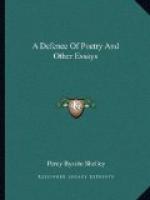The passion of revenge is originally nothing more than an habitual perception of the ideas of the sufferings of the person who inflicts an injury, as connected, as they are in a savage state, or in such portions of society as are yet undisciplined to civilization, with security that that injury will not be repeated in future. This feeling, engrafted upon superstition and confirmed by habit, at last loses sight of the only object for which it may be supposed to have been implanted, and becomes a passion and a duty to be pursued and fulfilled, even to the destruction of those ends to which it originally tended. The other passions, both good and evil. Avarice, Remorse, Love, Patriotism, present a similar appearance; and to this principle of the mind over-shooting the mark at which it aims, we owe all that is eminently base or excellent in human nature; in providing for the nutriment or the extinction of which, consists the true art of the legislator. [Footnote: The savage and the illiterate are but faintly aware of the distinction between the future and the past; they make actions belonging to periods so distinct, the subjects of similar feelings; they live only in the present, or in the past, as it is present. It is in this that the philosopher excels one of the many; it is this which distinguishes the doctrine of philosophic necessity from fatalism; and that determination of the will, by which it is the active source of future events, from that liberty or indifference, to which the abstract liability of irremediable actions is attached, according to the notions of the vulgar.
This is the source of the erroneous excesses of Remorse and Revenge; the one extending itself over the future, and the other over the past; provinces in which their suggestions can only be the sources of evil. The purpose of a resolution to act more wisely and virtuously in future, and the sense of a necessity of caution in repressing an enemy, are the sources from which the enormous superstitions implied in the words cited have arisen.]




